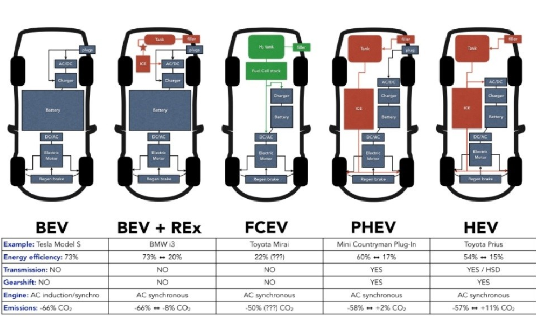Electric vehicles have witnessed a surge in popularity, with an 83 percent increase in the number of electric vehicles on U.S. roads from 2018 to 2021. As the market grows, understanding the distinctions between Battery Electric Vehicles (BEV), Hybrid Electric Vehicles (HEV), and Plug-In Hybrid Electric Vehicles (PHEV) becomes crucial for making an informed purchasing decision.
BEV (Battery Electric Vehicle)
BEVs rely solely on electricity and lack a combustion engine. Examples include the Tesla Model S, Nissan Leaf, and BMW i3. Their larger batteries serve as the exclusive power source, offering zero emissions and a serene driving experience due to the absence of engine noise.
Despite their eco-friendliness, BEVs have a shorter range compared to HEVs and PHEVs, necessitating more frequent recharging, which can be inconvenient for long-distance travel.
HEV (Hybrid Electric Vehicle)
HEVs operate with both a combustion engine and an electric battery. The smaller battery powers the electric motor, with energy recaptured during braking and deceleration. Popular HEVs include the Toyota Prius and Honda Insight.
While not as environmentally friendly as BEVs due to combustion engine emissions, HEVs boast an extended range, making them suitable for long-distance driving without the need for frequent recharging. Affordability is often a key advantage of HEVs compared to all-electric options.
PHEV (Plug-In Hybrid Electric Vehicle)
PHEVs share similarities with HEVs but feature a larger battery that can be recharged through an electrical outlet. Examples include the Hyundai Tucson Plug-in Hybrid and Honda Clarity. The larger battery in PHEVs allows for a substantial electric range, combining the benefits of electric and combustion engine assistance.
PHEVs emit fewer emissions than HEVs, especially during shorter trips when the battery powers the vehicle independently. While PHEVs can be pricier than HEVs, they are generally more affordable than BEVs.
Choosing Between BEV, HEV, and PHEV
Your choice among BEV, HEV, and PHEV depends on your specific needs and preferences.
- Opt for a BEV if you prioritize environmental friendliness and a noise-free driving experience.
- Choose an HEV if you value an extended range without frequent recharging and seek a more budget-friendly option than BEVs.
- Consider a PHEV for a longer electric range, reduced emissions, and a balance between environmental impact and cost.
Ultimately, the decision rests on aligning the unique features of each electric vehicle type with your driving habits and priorities.
FAQs
1. How frequently does a BEV battery need replacement?
The typical lifespan of a Battery Electric Vehicle (BEV) battery is approximately 10 years or 200,000 miles before requiring replacement.
2. How often does an HEV battery need replacement?
The average Hybrid Electric Vehicle (HEV) battery lasts around 8 years or 100,000 miles before necessitating replacement.
3. What is the replacement interval for a PHEV battery?
A Plug-In Hybrid Electric Vehicle (PHEV) battery has an average lifespan of about 10 years or 150,000 miles before it may need replacement.
4. What is the cost of replacing a BEV battery?
The replacement cost for a BEV battery ranges from $8,000 to $20,000, depending on the specific model and manufacturer.
5. How much does it cost to replace a hybrid (HEV) battery?
Replacing an HEV battery can cost between $2,000 and $8,000. To keep costs reasonable, consider trusted hybrid battery retailers like Exclusively Hybrid, offering quality products at more affordable prices compared to dealers.
6. How can I determine if my hybrid battery needs replacement?
Several indicators suggest a potential need for hybrid battery replacement, such as:
- Reduced fuel economy
- Decreased electric range
- Illumination of the check hybrid system or IMA light
- Loss of power and acceleration
- Battery overheating
- Inability to start the vehicle
If you observe any of these signs, it is advisable to seek a diagnostic test from a reputable hybrid mechanic or dealer to assess the condition of your hybrid battery.

